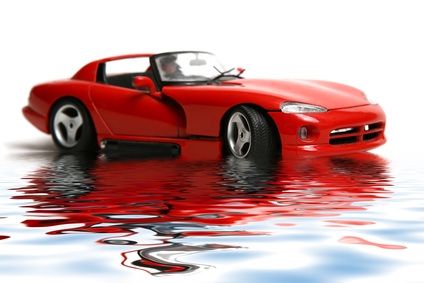
Rust is an oxidized metal that is broken down or corroded because of a material reaction, which can occur in the presence of iron, oxygen and water. Fortunately, newer cars are galvanized or coated with steel to prevent rusting. Over time that coating will wear, and rusting will occur on your car's body. Water, salt and your driving habits are some reasons why your car is rusting. Rusting appears on the trunk of your car, the bottom of the doors, the engine compartment or the fenders, according to the Fiat Page.
Water is a big factor determining why your new car is rusting, which is especially the case if you live in a climate that rains often. Rust can occur when there are torrential downpours or when you are driving through puddles. The water can end up seeping into certain parts of your car, including the rear tires, wheel wells and fenders. If the car does not dry out properly, the water causes these metal parts to rust over time. Dry out the car in a garage or a parking garage if this happens, which will help to prevent the rust. Avoid driving in puddles so water cannot splash into these parts of your car.
Salt can cause rust on cars if you live in Northern parts of the U.S. or in other climates where it snows. Road salt prevents drivers from sliding on the icy or snowy roads in the winter. When driving, the salt flies onto your car and coats it with a dirty shade of gray. It especially adheres to metal, which causes the corrosion process. Most of the rust from the road salt occurs underneath the car or on the rear tires. Protect your car from winter rust by washing it often. Spray all of the salt and debris off with a garden hose so it does not stick to your car's metal parts. Maintain the coating on your new car by touching up the paint on it. Staying off the roads in the winter and keeping your car in the garage can also prevent rusting.
Your driving habits can affect the way that your new car corrodes. Driving too close to other vehicles can cause rocks, pebbles and other particles to fly onto your car. Even if other cars drive fast by you, they are throwing rocks and pebbles that could nick your car. Rust forms on exposed nicks in a matter of time, according to the Corrosion Doctors website. To prevent this from happening, drive a bit further from the other cars in front of you. Also, drive on paved roads rather than pebbled roads, especially around construction sites that have gravel-covered areas, which can reduce the chances of rust appearing on your new car.